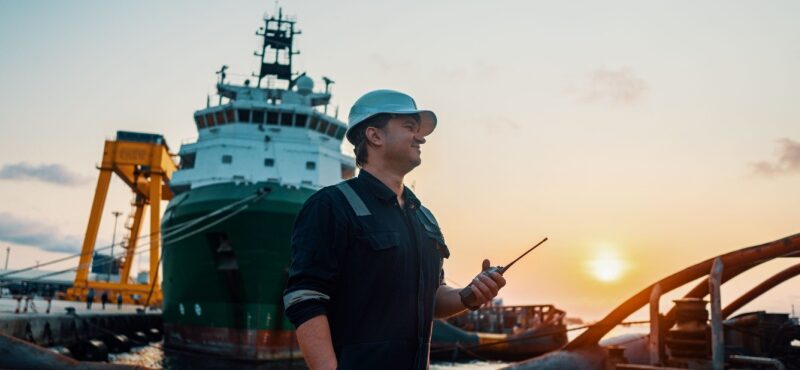Whether you’re a seasoned sailor or new to boating, understanding marine communication is essential for safe and effective navigation on the water. Communication systems like VHF radios, satellite phones, and marine communication apps play a crucial role in ensuring that boaters can stay connected, navigate safely, and respond to emergencies. Today we’ll be looking at some of the essential communication tools every boater should know about and how they contribute to overall maritime safety.
The Importance of Marine Communication
Marine communication is critical for both everyday boating and emergency situations. It ensures that vessels can communicate with each other, harbors, marinas, and coast guard stations. Whether it’s navigating through busy channels, checking weather updates, or responding to distress calls, reliable communication is essential to keeping everyone safe on the water.
VHF Marine Radios: The Backbone of Boating Communication
What is a VHF Marine Radio? VHF (Very High Frequency) marine radios are the primary communication tool used by boaters. These radios operate on designated maritime frequencies and are used for routine communication, weather updates, and emergency broadcasts. Every boater should have a working VHF radio on board, as it is the most reliable and commonly used tool for communication at sea.
How to Use VHF Radios: VHF radios have specific channels for different types of communication:
- Channel 16 is the international distress and hailing frequency. This channel is monitored by the coast guard and other vessels, and it should only be used to make emergency calls or establish contact before switching to another channel.
- Channel 22A is used by the U.S. Coast Guard to provide navigational warnings and respond to distress calls.
- Weather Channels (WX) provide real-time weather updates, which are essential for safe boating.
When using a VHF radio, it’s important to keep messages clear and concise. Always identify your vessel and location, especially in emergency situations.
Licensing and Regulations: In the U.S., recreational boaters are not required to have a license to operate a VHF marine radio, but commercial vessels are. It’s essential to familiarize yourself with any local or international regulations regarding VHF radio use before setting sail.
Satellite Phones: Communication Beyond VHF Range
Why Satellite Phones? For boaters traveling offshore or in remote areas where VHF signals may not reach, satellite phones are an invaluable communication tool. Satellite phones use satellites to transmit signals, allowing communication from virtually anywhere in the world, regardless of distance from shore. These phones are often used for long voyages, fishing expeditions, or cruising in areas where reliable VHF coverage may not be available.
Choosing a Satellite Phone: There are several satellite phone providers, including Iridium, Inmarsat, and Globalstar. Each has different pricing plans and coverage areas, so it’s important to select the right service based on your boating needs. While satellite phones provide more coverage than VHF radios, they can be more expensive and are usually considered a backup or complementary tool for communication.
Digital Selective Calling (DSC): Emergency Communication at Its Best
What is DSC? Digital Selective Calling (DSC) is a modern communication system that enhances the safety and functionality of VHF radios. With DSC, boaters can send automated distress signals to coast guard stations and nearby vessels, transmitting their exact location and the nature of the emergency. This feature saves valuable time during distress situations and increases the likelihood of a swift response.
How to Use DSC: DSC is built into most modern VHF radios. In the event of an emergency, you can press the DSC button, which automatically sends a distress signal along with your boat’s GPS location. It’s important to ensure that your DSC-enabled VHF radio is properly set up and connected to your GPS system for this function to work effectively.
EPIRBs and PLBs: Emergency Position Indicating Devices
EPIRBs (Emergency Position Indicating Radio Beacons) EPIRBs are emergency devices that transmit a distress signal to rescue authorities via satellite. They are designed to be used in life-threatening emergencies, such as sinking or capsizing. Once activated, EPIRBs transmit a signal that includes your location, allowing rescue teams to find you even if you’re far from shore or in a remote area.
PLBs (Personal Locator Beacons) Similar to EPIRBs, PLBs are personal devices that also send distress signals. However, PLBs are portable and can be worn by individual crew members. They are especially useful for smaller boats or when venturing solo, providing an added layer of safety if a person overboard incident occurs.
Marine Communication Apps and New Technologies
Mobile Apps for Navigation and Weather: Several marine communication apps are now available for smartphones, offering tools for navigation, weather updates, and emergency alerts. While these apps should not replace VHF radios or satellite phones, they can provide additional information and help boaters stay informed. Popular apps include Navionics, PredictWind, and MarineTraffic.
The Future of Marine Communication: As technology advances, more boaters are turning to integrated communication systems that combine VHF, DSC, satellite communication, and digital apps into one streamlined platform. These systems offer convenience and redundancy, ensuring that boaters have access to reliable communication no matter the circumstances.
Staying Connected at Sea
Marine communication is essential for ensuring safety and coordination on the water. From VHF radios to satellite phones and DSC systems, every boater should be equipped with the right tools to stay connected and respond to emergencies. Understanding how to use these tools and having a reliable communication plan in place can make all the difference in staying safe at sea.
For boaters looking to upgrade their marine communication systems, Highland Wireless offers a range of solutions tailored to meet the needs of recreational and commercial mariners. Contact Highland Wireless now to learn more about our marine communication options and how they can enhance your safety on the water.

